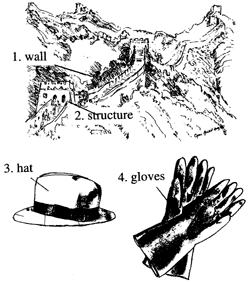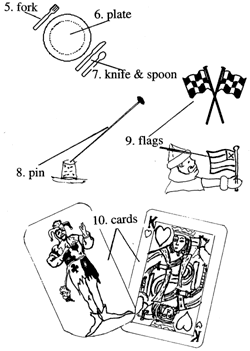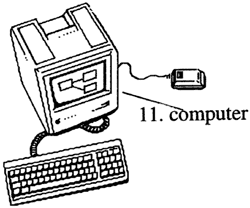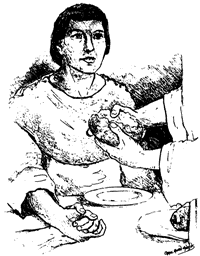Unit 29: Order
Pictured Words
New Words

| 1. wall
|
| 2. structure
|
| 3. hat
|
| 4. gloves
|

| 5. fork
|
| 6. plate
|
| 7. knife and spoon
|
| 8. pin
|
| 9. flags
|
| 10. cards
|

| 11. computer
|
Nouns
Sayings
The gloves are near to my hat, far from that point over there.
The wrong cards always put me far from winning.
Trees are far from beautiful in winter.
His plate is far from empty.
A computer is near necessary for business.
A pin is near as good as a hook for fishing.
The hollow in those leaves is near full of water.
She made a near record selection of hats, dresses and gloves for the union's competition.
Order
Near and far show the position of one thing with respect to another.
They are often said as near to or far from the thing they have relation with.
But the preposition to may be left out, as in the examples for near:
Near
this town, now, is near, and it is a little one.
better is a neighbour who is near than a brother far off.
you see that the summer is near.
be not far from me, for trouble is near.
Far
Let such a thing be far from you.
keeping himself far from evil.
let it be far from God to do evil.
you are not far from the kingdom of God.

He Walked Beside Them
And then, two of them, on that very day, were going to a little town named Emmaus, which was about seven miles from Jerusalem.
And they were talking together about all those things which had taken place.
And while they were talking and questioning together, Jesus himself came near and went with them.
But their eyes were not open that they might have knowledge of him.
And he said to them, What are you talking about together while you go?
And he made clear to them all the things in the Writings, from Moses and from all the prophets, which had to do with himself.
And they came near the town to which they were going, and he seemed as if he was going on.
But they kept him back, saying, Do not go, for evening is near, the day is almost gone.
And he went in with them.
And when he was seated with them at the table, he took the bread, and said words of blessing and, making division of it, he gave it to them.
And then their eyes were open, and they had knowledge of him;
but he went from their view.
And they said to one another, Were not our hearts burning in us while he was talking to us on the way, making clear to us the holy Writings?
And that very hour they got up and went back to Jerusalem, where the eleven and the others had come together.
Additional Reading
This great story has been the experience of many men and women throughout time.
They, too, have got a fresh view on life when they had "a meeting with Jesus".
Have in mind that these two men were very sad.
They had come to a bitter experience when their Master had been put to death by the rulers of their land.
Then a stranger came to them and he gave them the new view on things that they had so much need of.
That stranger was Jesus.
We may take note that he made out he would go on.
Only when they said to be with them for the night, did he say, yes.
He did not seem to be forceful.
It was to be their decision.
They might have their friend with them, or they might not.
But, if he had gone on, they would never have seen this stranger as being their master.
It was when the stranger took the bread in his hands that they saw who he was.
Some say that the two men may have been with Jesus when he gave food to the five thousand from only five loaves of bread and two small fish.
You have already been given that story.
If so, they would have seen his hands taking hold of the five loaves then.
But it is certain that this was no formal event, and not a special religious practice, like a "communion".
Many persons have seen him in such everyday experiences since that time: in their houses;
in the offices at work;
in the fields, forests or on the beaches when at work or at play.
This meeting with the stranger was a great event for the two men.
Whereas the two had been taking a road that went to the west and away from Jerusalem, they now went in the opposite direction.
They had been journeying to the sunset but now they turned east to the sunrise.
They had great news to be told, so within the hour they were on their way back to Jerusalem.
They could not have a sleep and do it tomorrow!
They had to do it now!
True friends always give each other good news quickly like that.
What a surprise met them there.
In Jerusalem, Peter had seen Jesus too.
Helpful Notes
| Jerusalem
| the central town of Palestine, we now say the capital.
|
| talking and questioning
| question and answer about things.
|
| said words of blessing
| gave thanks for the bread.
|
| hearts burning
| a feeling of great pleasure.
|
| bitter experience
| a great amount of trouble.
|
| not seem to be forceful
| not trying to make their minds change.
|
| no formal event
| it was quite a natural happening.
|
| communion
| a set order of church service.
|
| turned east to the sunrise
| turned from the way they had in mind.
|
Interesting Facts and Records
Records and Writings
In early times there were no written records of ownership.
Arguments about property were dependent upon ideas of past connections.
The time one's fathers had lived in a place was important.
The idea was that they were still living and watching from afar.
And so, it came about that one should have knowledge of his past.
His records were kept on a stick that became a union with his long line of fathers.
The son of a property owner would say the record over as the stick was slowly turned.
Then it would be put in a place of honour.
It became the household god.
It was a serious thing to Laban when Rachel stole his household gods.
They had both a religious connection and a property ownership relation.
It may well be that putting records on a stick gave them only a small amount of space in which to have them cut.
In much the same way as now, space was important.
In those days a long line of fathers had to go on one stick, so vowels were left out.
A like thing has happened in our own time.
Computer statements had to be short with our early chips.
They were not large enough for long ones.
The vowels were left out until we got larger units.
Short records do have their value.
It is not easy to give clear arguments about early times, but we do know that early records were short.
This we have learned from all the plates of earth which were found around early towns.
The writing on those plates was made with a short piece of stick with a sharp, flattened point.
Its end was put into the soft wet earth to make marks before the plates were put out to dry.
Naturally, the smaller the space used, the easier it was to take hold of the plates.
Writing in Mesopotamia was short.
In Egypt, important rulers had special rooms for when they died.
These were made attractive by pictures on the walls.
They gave an advertisement of their life's main acts.
Writing there was with pictures.
Moses started his life as a chief in Egypt.
He was given teaching in the reading of these pictures.
But, he would also have been taught to read much shorter forms of writing.
This was with letters that were written onto leaves of water-plants.
So, there were different forms of writing.
Because of small space the writing automatically was kept to the least number of letters possible.
A big adjustment was made when the different systems of writing were put together into one system.
That was the result of trade and transport between the nations of the time.
This development was made in North Palestine by persons who went sailing in ships in the Great Sea the Mediterranean.
The Hebrew language came from that development.
It may well be for such reasons that Hebrew does not have letters for vowels, only for consonants.